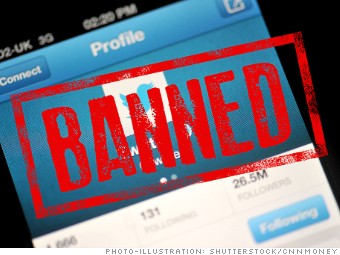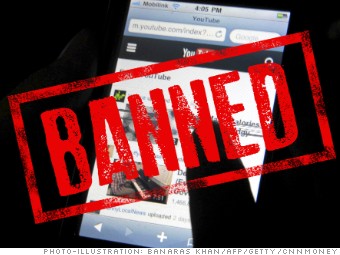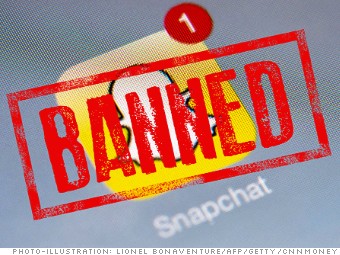Change is afoot in China. Its leaders have promised a decisive role for markets in the huge economy, and recently lifted a 14-year ban on games consoles. But in many areas, there's still a long way to go.
Try using Twitter (TWTR), for example. Too bad!
The social media platform can't be accessed from within the so-called Great Firewall of China, a censorship project operated for decades by the Communist Party.
Thousands of websites cannot be viewed inside China either, but social media platforms draw special attention from censors.
China turned out the lights on Facebook (FB, Fortune 500) in 2009, and there are no signs that Beijing plans to restore access to the U.S.- based social media platform.
Some analysts trace the ban to riots that broke out in July of that year between Muslim Uighurs and Han Chinese in the restive western region of Xinjiang.
But others also cite a protectionist commercial motive.
China-based social media sites are allowed to operate in the country, which helps to promote the domestic tech industry. Still, these platforms are heavily censored. Domestic operators accept this as a fact of life, while western tech firms are much less likely to give up control.
.
Foreign films
Chinese regulators allow only 34 foreign films to be shown in theaters each year, severely limiting access to the latest Hollywood blockbusters.
Approved films still face the heavy hand of government censors, who cut anything the Communist Party considers offensive or subversive.
Chinese audiences love the slimmed-down foreign films, and Hollywood is eager for regulators to expand their quota.
Despite the commercial advantage it gives them, Chinese filmmakers are likely to continue to bump heads with Beijing over censorship. China heaped praise on Taiwan-born director Ang Lee when he won the Academy Award for Best Director in 2005. His film, Brokeback Mountain, was never shown in China.
Casinos
Beijing outlawed gambling in 1949, and casinos are not allowed to operate in China. Yet many Chinese have an inclination toward games of chance, a tradition that dates back thousands of years.
Today, the blanket ban doesn't stop entrepreneurial Chinese from setting up underground gambling operations and private lotteries.
The policy has also given rise to a ring of casinos that operate just outside Beijing's reach. The most notable of these territories is Macau, which boasts a casino industry that isseven times larger than Las Vegas.
Websites
Beijing blocks access to thousands of websites at any given time, including social media platforms and websites that host pornography.
Censors also prohibit Internet users from visiting sites that criticize the Communist Party or address sensitive issues such as human rights.
Search results and social media chatter are also censored, forcing Internet users to come up with a clever alternate language to discuss news or historical events like the Tiananmen Square protests and crackdown.
The massive censorship project has been dubbed the Great Firewall of China, and using a Virtual Private Network or secure proxy are the only ways to access forbidden websites.
Books
China's General Administration of Press and Publication screens all books before publication in China, and censorship is standard procedure.
Critical talk regarding human rights, Tibet or the Communist Party is off limits. Reporting on the wealth of Chinese officials is also forbidden.
Publishers that skirt the rules are quickly shut down, leaving authors with a choice: Agree to censorship or forfeit access to 1.4 billion potential readers.
Books are often smuggled into China from jurisdictions including Hong Kong, where publishers enjoy more freedom. Bookstores in the city overflow with works on everything from President Xi Jinping to the devastating Chinese famine that killed upwards of 45 million people during the Great Leap Forward.
Snapchat
Facebook and Twitter aren't the only social media platforms blocked in China. Chinese users are unable to access Snapchat, either. Youtube is also blocked.
Keeping western firms out has given Chinese tech companies ample time to develop their own networks.
A few of those homegrown platforms are now flourishing.
Weibo and WeChat boast hundreds of millions of users, while streaming video sites Youku, Sohu and iQiyi are very popular.






No comments:
Post a Comment